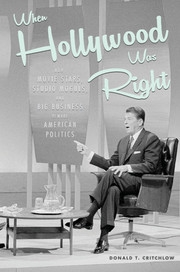2 - Anticommunism Comes to Hollywood
Published online by Cambridge University Press: 05 October 2013
Summary
History, as it has been written, portrays the Hollywood Red Scare that came to the film industry after the Second World War as the dark days of Hollywood. Reputations were destroyed, lives tragically disrupted, and many careers ended by the blacklist. The story of repression, hysteria, and betrayal in those scoundrel days of the late 1940s and the 1950s has been sympathetically told and retold in haunting detail in popular and scholarly histories, novels, movies, and film documentaries. This narrative frequently presents the apologists of Stalinist totalitarianism as the protectors of freedom, while Hollywood anticommunists are rendered as representatives of repression.
This received story portrays Hollywood anticommunists – most notably popular actors such as Gary Cooper, Robert Taylor, John Wayne, and Ronald Reagan – as narrow-minded right-wingers. As the mother of well-known actress Ginger Rogers, Lela Rogers, a founding member of the Motion Picture Alliance, a Hollywood anticommunist group formed in 1944, told House Un-American Activities Committee (HUAC) in its executive session in March 1947, we were “blasted all over, being called fascist, anti-Jew, and anti-union.” Being anticommunist in liberal Hollywood was not easy either, apparently.
- Type
- Chapter
- Information
- When Hollywood Was RightHow Movie Stars, Studio Moguls, and Big Business Remade American Politics, pp. 42 - 75Publisher: Cambridge University PressPrint publication year: 2013



